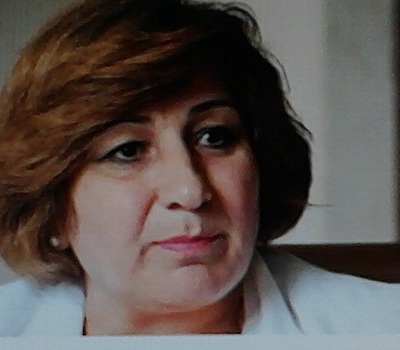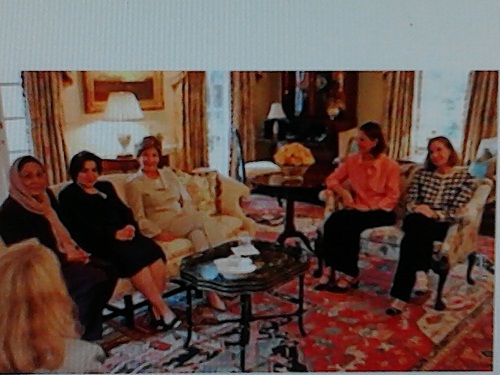
Interview of Pascale Warda with Faith Voice Organization
- Pope Francis should hear directly from women, not about women from other men
Pascale Warda is an Iraqi human right defender and politician. She was one of only six women in the Iraqi transitional government after the fall of Saddam Hussein and currently leads the Hammurabi Human Rights Organization, which she co-founded. She is also a deeply faithful Catholic who is fierce about the role that women need to play in our church and society – for the benefit of all of us. Her wish is that Pope Francis would create opportunities to listen to women more directly: “Pope Francis, like all men, needs to know from women about our needs. He should hear from women, not about women from other men.”
Making a difference in politics
“God has created first human beings, not men first and women after, we have to be clear about that. Women are neglected in the desicion-making of the Church. We have to request of the Holy Father that this changes.”
Pascale Warda is clear: “Some people say that politics equals lies but that is a crime! Politics is a way of helping rights of others. When you are elected, you have a responsibility to people.”
As a Minister of Migration and Displacement in 2004, she headed a newly created institution in a highly volatile situation and was responsible for over 5 million people. Did she approach this challenge differently as a woman? “Women took responsibility to humanize solutions.” she believes, “even men, when they saw women’s approach, were changed.”
“The ministries led by women were a very positive witness for women in Iraq,” Warda is convinced. It was not just a proof that women can take on leadership roles but also demonstrated the integrity and professionalism that women brought with them. “The ministries led by women were the least corrupt,” believes Warda. This is according to her not because women cannot be tempted by power but because women tend to have the longer view of what is important beyond immediate gains.
Warda recalls being confronted by people who told her that corruption was normal and that they were not hurting anyone, just “taking from the state.” “But who is the state,” Warda asks forcefully, “I showed them the children on the street and told them – are these the children of the streets? No, they are the children of Iraq and you are stealing their rights!” When further challenged that one person cannot make a difference, Warda would retort: “I am one, not a zero, I am one! And tomorrow we can be two, the day after tomorrow three! It is our duty as mothers to stand up against injustice and corruption.”
We need to empower lay Christians in Iraq
Warda founded the Hammurabi Human Rights Organization (HHRO) to defend the rights of Christians in Iraq. She reminds us that Christians are some of the “original citizens” in the area that is now known as Iraq, and Christian presence dates back to the times of the apostles. In recent decades – under the regime of Saddam Hussein and after the regime change – Christians have been targeted with violence and their numbers in the region have been rapidly decreasing. Warda is not afraid to use the word “genocide” to describe the systematic targeting.
The mission of HHRO however gradually expanded to represent other minorities such as the Yazidis as well as those from the majority Muslim population who suffer human rights violations. “We are defenders of human rights – and human rights belong to all human beings,” she explains.
Part of the mission of HHRO is to work on reconciliation in Iraq. To achieve progress on this, Warda believes, “we have to show that we are all citizens of this country rather than focusing on narrow sectarian interests.”
When asked about the relation between Christianity and human rights, Warda replies: “Christianity views human beings with dignity. In the same way, human rights protect men and women to live with dignity. Jesus died on the Cross for the dignity of human beings so Jesus is the main defender of human rights.”
Warda is convinced that Christians in Iraq need to develop stronger lay leadership. “We need lay people to take responsibility and say “yes, we can do it.” To open possibilities for laity, Warda believes that the local patriarch and bishops should learn to look for qualified, competent lay people to take on leadership roles. “Christians have a responsibility as citizens of Iraq,” Warda points out, and the country badly needs leaders to stand up to corruption and sectarian divisions.
Among the laity, the voices of lay women are crucial. Women experience firsthand the struggles of families and communities and have better sense of working for the common good, rather than focusing on their own profit.
Jesus gave a mission to women

Pascale Warda in meeting with Laura Bush in the White House
And what is Pascale Warda’s opinion of the position of women in the Catholic Church? “God has created first human beings, not men first and women after, we have to be clear about that,” Warda points out a common misconception based on imprecise translations of the creation story in Genesis. “Women are neglected in the desicion-making of the Church. We have to request of the Holy Father that this changes,” she argues passionately and continues: “We have to see women as active in the evangelical mission of the Church. Women and men must work side by side, sharing thinking, sharing decisions, sharing solutions. If women are experienced in the Church’ decision-making – not necessarily as priests but as lay persons – when you see their decisions, a change of perception would have to come.”
Warda is firmly grounded in her faith as a reference point for her convictions. “We have to look to Jesus, and Jesus gave women the mission to be apostles.” she states, alluding to the encounter of Mary of Magdala with the resurrected Jesus, “so all Christians are equally called to be apostles.”
Warda urges us: “The solution for our world is charity and love. We have to be like Jesus, we have to become more Christian, our lives are not about status or money, we are called to make a difference.”
Warda is used to people who tell her that she should be more realistic but she disagrees. “If we put measure to our work, we put measure to God but God has no measure, God is infinite. So we must not look what others are doing but follow our evangelical mission.”
Warda, who met personally Pope John Paul II and Benedict XIII and briefly interacted with Pope Francis, is excited about the new energy that Pope Francis brought to the Church. “His teaching is direct to the heart and there are many possibilities ahead of us.” she believes “We have to think with our minds but act with our hearts, women can do this in profound ways.” Her wish is that Pope Francis would create opportunities to listen to women more directly: “Pope Francis, like all men, needs to know from women about our needs. He should hear from women, not about women from other men.

